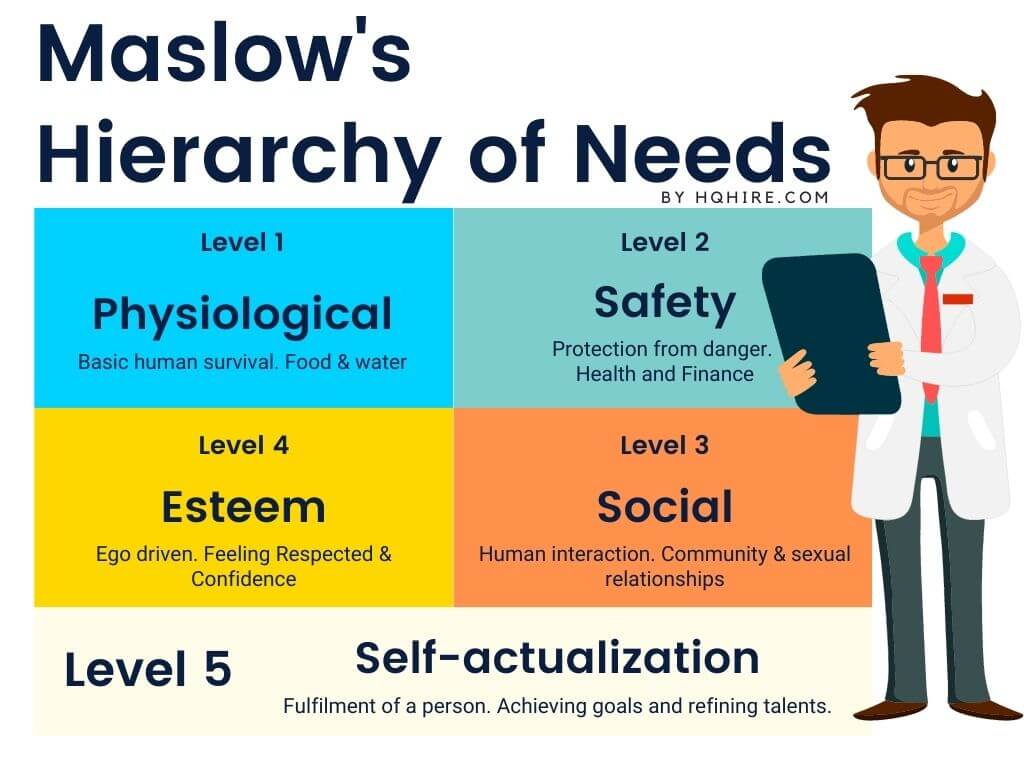Are you happy with your current job? The most recent job satisfaction stats show that more American workers are happier with their jobs now than they were before.
Surprise? Understanding these statistics and facts can help you reduce the turnover rate and increase employee retention.
Let’s dive into some of these surprising job satisfaction statistics to have a better understanding of why!
Shocking World Job Satisfaction Statistics (Editor’s Pick)
- Employees who are satisfied with their job will have a 55% spike in engagement.
- 96% of Employees think empathy is the most important for employee retention.
- Employees are 4.6 times more likely to perform better when they feel their voices are heard
- Employees in managerial positions are 62% more likely to feel satisfied at their job.
- Fully company-paid medical insurance is the most wanted benefit voted by 58.6% of respondents.
- Simple benefits like free snacks can help improve the job satisfaction level of 37.3% of respondents.
Why Employee Job Satisfaction Is Important To The Company
Employee job satisfaction is important to the company because it directly affects employee productivity and motivation.
When employees are satisfied with their jobs, they are more likely to be productive and motivated to do their best work. This can lead to positive outcomes for the company, such as higher profits and better customer service.
In addition, employee job satisfaction can help reduce turnover rates, which can be costly for companies.
1. “Employees who are satisfied with their job will have a 55% spike in engagement.”
Improving employee engagement is one of the hardest to achieve. For an employee to be engaged, he/she has to feel motivated to work towards the goal.
Employees who are satisfied with their job will be more willing to go the extra mile and become more engaged in the project or task. This improves productivity and will have a positive impact on the company.
In fact, employees who are satisfied with their job will have a 58% higher level of focus compared to employees who are just feeling “OK”.
2. “110% more likely to stick to the same company if an employee feels appreciated.”
Work satisfaction report indicated that when the employees feel genuinely appreciated, They are more likely to stay with their organization for more than 1 year.
Similar to feeling respected, this fulfilled the third and fourth levels of Maslow’s hierarchy of needs; Safety needs and Esteem needs respectively.
When employees feel appreciated, they will have a higher sense of job security as well as higher confidence when performing at work.
3. “13% more sales if employees are satisfied with their job.”
Job satisfaction has a direct impact on the bottom line of the company. Keeping employees happy can help companies to increase their sales and productivity.
This is the reason why Google and Facebook create an office environment that makes employees want to come to work.
Providing great benefits ranging from Free snacks to health insurance, Google ensure its employees are satisfied in their job.
10,129 Americans joined the survey done by Blind.
Here are the Top 15 companies with the highest job satisfaction:
- Netflix
- Bloomberg
- ServiceNow
- Tesla
- PayPal
- Lyft
- Spotify
- T-Mobile
- VMware
- Indeed.com
- Cisco
U.S. Job Satisfaction Statistics
1. “1 in 2 employees in the U.S. get a sense of identity from their job.”
A job can be just a source of income, or something more.
According to a study done by Pew Research Center,
51% of all Americans feels that their profession gives them a sense of identity.
In other words, your job fulfills level 3 of the human needs; Love and belonging needs.
Many Americans find their purpose in life in the work they do.
While the other half of the respondent feels their job is just a source of income that they do for a living.
2. “Lack of job satisfaction cost U.S. companies $550 billion dollars each year.”
A recent report by The Engagement Institute shows that more than half a trillion dollars is lost each year due to disengaged employees.
The amount lost each year is climbing steadily and will reach $1 Trillion in the next decade.
Respondents to the study are fully aware that they are not fully engaged during work.
Top 3 reasons for disengagement
- Lack of compelling missions
- Lack of trust with their leaders
- Job scopes are confusing and unclear
A healthy organization should have clear communication channels and leaders who not only focus on the bottom line but on the well-being of their employees.
3. “1 in 4 employees in the U.S. think they are not paid enough for their work.”
The correlation between Job satisfaction and appropriate pay is probably the most obvious.
27% of employees in America feel that they are unpaid and are unsatisfied with their job.
This statistic coincides with other statistics, where 25% of employees surveyed will quit their job because of money.
The average pay of a general employee living in the United State can range from $40,000 to $90,000 depending on which state you are staying in.
With data so similar, the correlation between the feeling of being underpaid and the probability of an employee leaving a job is indisputable.
4. “4 in 5 U.S. employees think company culture is a huge factor in job satisfaction.”
Company culture plays a huge role in employee retention. In fact, studies show, that 57% of Americans will take up a job with a competitor if believe they will have a better company culture than their current company.
According to the study.
Top 5 company cultures that will impact job satisfaction
- Respected by others
- Equality between peers
- Trust between coworkers
- Integrity of the management
- Teamwork between coworkers
Keys to Employee Satisfaction
In order to have success in any business, you need to have happy and satisfied employees. Employee satisfaction is key to your company’s success, and here are some of the main keys to employee satisfaction.
1. “Employees are 4.6 times more likely to perform better when they feel their voices are heard.”
The feeling of being heard and valued helps to empower employees to perform even better at work.
The two-way communication between the worker and the employer drives productivity.
Studies have shown, that companies voted to be the most gender and ethnic diverse consistently outperform their competition.
These companies have a more diverse group of people invited to the table. They ensure each voice is heard.
With an open mind, these companies incorporate a border range of perspectives into their decision planning.
Allowing your employee to feel that their voice is being heard will improve job satisfaction and productivity. This is a win-win formula for employee’s retention and company’s success.
Antony C., Editor, HQHire.com
2. “Employees are 63% more satisfied with their job if they are being respected at work.”
A survey by Harvard Business Review shows that, when employees are respected by their leaders, their job satisfaction level goes up by 63%.
Then feeling of being respected is in correlation with the level of productivity seen in an employee.
Why?
According to Maslow’s hierarchy of needs.
Being respected fulfills the fourth level of human needs.
Esteem needs are the sense of feeling respected at work.
Fulfilling this level of need helps to elevate the happiness level of a person, and thus job satisfaction.
3. “96% of Employees think empathy is the most important for employee retention.”
The relationship builds between the employee and the company is often the main factor for employee retention.
Forbes suggests that almost all employees view empathy as the most important reason why they should stay with a company.
A company should show empathy for its people, encouraging employees to take vacations, provide health insurance, and celebrate the important moments of their life.
These simple actions can increase employees’ job satisfaction and the quality of their work.
“Your work is going to fill a large part of your life, and the only way to be truly satisfied is to do what you believe is great work. And the only way to do great work is to love what you do.”
Steve Jobs, CEO, Apple
Job Satisfaction Statistics By Profession
Job satisfaction statistics by profession can be helpful in determining which careers may be a good fit for you. It can also help you understand what to expect in terms of job satisfaction if you are already employed in a certain career. Looking at job satisfaction statistics can give you some valuable insights into the world of work.
One thing to keep in mind is that job satisfaction statistics can vary greatly depending on the country in which they are compiled.
1. “Employees in managerial positions are 62% more likely to feel satisfied at their job.”
Pew Research Center has found some surprising statistics.
Employees in managerial position are more likely to say they are satisfied with their jobs, compared to 48% for those who perform manual labor, or non-managerial roles.
Even with more responsibility and higher stress levels in a management role, the employees are actually more satisfied with their job.
This is because, with a higher position in the company, the employees are given more perks.
- Healthcare
- Paid time off
- Robust leave entitlements
- Retirement saving plan
- Allowance schemes
- Professional development programs
- Etc.
2. “70% of educators feel their job gives them a sense of identity.”
Studies conducted by Pew Research Center show that educators score one of the highest in the sense of identity.
Most employees working in education think their work makes them who they are.
The fulfillment they get from their work fulfills their self-actualization needs. The act of teaching helps to refine talents.
Educators gain a sense of achievement as they see their students grow which improves their level of job satisfaction.
3. “62% of healthcare workers feel what they do defines them.”
Studies have found that healthcare workers score one of the highest sense of identity at what they do.
Healthcare workers’ work is all about saving a life. Work done by healthcare workers almost always will have a positive impact on society.
Furthermore, their actions have an immediate effect on the patients.
In psychology, this fulfills the feeling of instant gratification, that produces dopamine in your brain. This chemical in your brain is associated with pleasure and reward systems.
The combinations of these factors are probably what lead to high job satisfaction and a sense of identity.
“Everyone talks about building a relationship with your customer. I think you build one with your employees first.”
Angela Ahrendts, Senior Vice President, Apple
Work Benefits Job Satisfaction Survey
Employees derive a sense of satisfaction from their jobs when they feel that their work is benefiting them in some way. Work benefits can impact job satisfaction levels by providing employees with a sense of purpose, helping them meet their financial needs, and giving them opportunities for personal growth.
When employees feel that they are not getting the necessary work benefits, they may become dissatisfied with their jobs.
Top 10 Job Benefits Employees Want But Don’t Have
Fulfilling employees’ wants will help to increase their job satisfaction. The survey shows that 58.6% of all professionals surveyed hope their company will provide them with fully company-paid medical insurance. That is 1 in 2 of all employees surveyed.
The need of feeling safe and be taken care of is probably what drives the overwhelming results of having health insurance.
- 58.6% wants Fully company-paid medical insurance
- 53.2% wants Four-day workweek
- 53.1% wants Fully company-paid dental insurance
- 52.4% wants Unlimited paid time-off
- 47.2% wants Fully company-paid vision insurance
- 40.1% wants Work-from-home or remote working days
- 37.3% wants Free snacks
- 35.1% wants Performance bonus
- 32.7% wants Flexible paid time off
- 32.3% wants Transport allowance
Top 10 Job Benefits Most Company Gives
The survey shows that 72.8% of all professionals surveyed get paid time off as work benefits in their company.
Surprisingly 1 in 3 of the respondents don’t get paid time off.
Possibly, these are odd job workers or hourly-paid workers that don’t receive paid time off.
- 72.8% gives Paid time off
- 64.9% gives Retirement saving program
- 56.7% gives Free coffee
- 55.6% gives Partially company -paid medical insurance
- 45.9% gives Life Insurance
- 44.2% gives Partially company-paid dental insurance
- 38.8% gives Flexible schedule
- 36.7% gives Partially company-paid vision insurance
- 35.6% gives Performance bonus
- 34.0% gives Flexible paid time off
“Before you become a leader, success is all about growing yourself. After you become a leader, success is about growing others.”
Jack Welch, CEO, General Electric
Pursuit of Happiness with Maslow’s Hierarchy of Needs
Humans have 5 levels of needs that determine our human behavior. Starting from the lowest and most basic level of needs to the highest and hardest to achieve.
- Physiological needs: The first and the most basic needs. This is the need for basic human survival; food and water, rest, clothing and shelter, health, and reproduction.
- Safety needs: The second level of needs help us to survive. Safety needs are protected from danger, violence, and overall emotional stability and well-being. The pursuer of good health, and financial security.
- Love and belonging needs: The third level is the social needs related to human interaction. This is the need for friendship and family bonds. The need for physical and emotional intimacy with others. This can include the sense of belonging to a team, a company, a union, a club, or a community. Sexual relationships are also in this category.
- Esteem needs: The fourth is the first of the higher level of human needs that is ego-driven. This is the feeling of being respected and having confidence in yourself.
- Self-actualization needs: The highest level of needs is the fulfillment of your full potential as a person. This includes education, professional development, refining talents, or even achieving goals.
Fulfilling those human needs is the building block of a person’s happiness and the construct of higher job satisfaction.

Your next step?
Uncover the age-old question of “How much do you need to earn to be happy?”
Let’s get your answer to this most asked question with the power of science!
- Number of PMP Certified Holders By Country (211 Countries Worldwide Statistics)
- 10 Best Remote Jobs for College Students That Pays Well (with Tips)
- 10 Best Remote Jobs with No Experience Required (+Pays Well)
- 22 Top Industry Offering Remote Work Now (Future of Remote Jobs)
- 21 Best Remote Jobs to Work From Anywhere (High Paying)
Join over 11,000+ achievers who are committed to achieving their career goals!







